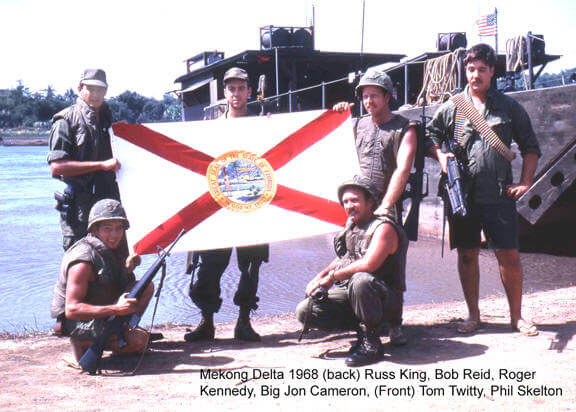Soldiers from the Army Reserve’s 231st Transportation Company were glowing after the ritual pre-bedtime 12-pack — a coping mechanism for the danger that lurked in the river. You never knew when the enemy would strike in the tangled confusion of the Mekong Delta. These Florida boys posted a guard each night whose responsibility was to chuck a quarter-pound TNT concussion grenade over the side, lest a malevolent diver wreaked havoc on the group from St. Petersburg, Florida.
“Really spooky, you’ve seen ‘Apocalypse Now?’ Spooky $#&% … I mean it was just like that,” said Tom Twitty, a member of 231st. “We tried to get out to a main river every night.”
Twitty served a 12-month mission in Vietnam. His unit was careful. No fatalities. His accounts of their time in Southeast Asia felt like scenes from the 1979 Francis Ford Coppola film. A type of surreal survival. Twitty left Vietnam unscathed.
The Army Reserve’s role in Vietnam was limited, and the 231st seemingly encapsulated the reservists’ experience. The dichotomy of the Coppola movie is akin to Twitty and his fellow soldiers. However, there was no crazed officer to assassinate. Just imminent threats, Mike Boat (LCM-8) rides, deliveries and beer.
The 231st brought supplies via watercraft — LCM-8’s — to bases scattered throughout the region from their base of operations in Vũng Tàu.
“We delivered to different bases all over the delta,” Twitty said. “But to get there, you had to go across the seas – about 35 miles to the isthmus of the Mekong Delta. And sometimes the storms had kicked up and these flat-bottomed boats, we’d come off a 20-foot wave, and sometimes our cabins were in jeopardy. Once we got up there, we had to pick the right river … all these deltas are like a spiderweb … We went all the way up to Cambodia. So it was quite an adventure.”
Troxler’s Truckers
The 319th Transportation Company of the Central Savannah River Area (Georgia) — known as Troxler’s Truckers — was another Army Reserve unit sent to Vietnam. The 319th — attached to the 48th Transportation Battalion — moved ammunition and rations via truck to divisions covering more than 1.1 million miles, according to the 319th Vietnam Veterans website. The company received a meritorious unit citation and incurred one casualty.
President Lyndon Johnson rejected a 1965 proposal to call up 235,000 guardsmen and reservists. The Department of Defense was all-in to send reserves to Vietnam, the elected officials not so much, according to “Historical Attempts to Reorganize the Reserve Components,” the Library of Congress.
The report further noted Secretary of Defense Robert McNamara assigned reservists combat service support roles in 1967, and by 1968, they were reportedly demoralized, ill-equipped and ill-prepared to mobilize.
The Army indicates that following the 1968 Tet Offensive, just under 6,000 Army Reserve soldiers were mustered and 3,500 deployed to Vietnam.
Reservists in Vietnam grew up together
Regardless of the context or background on why the Army Reserve deployed to Vietnam, the soldiers shared similar profiles and close-knit relationships within their units.
“These young men who had grown up together, lived in the same neighborhood, played together, attended grades first – 12th, attended college, were co-workers, married childhood sweethearts, and married sisters of other members of the company … as all childhood friends become,” The 319th Vietnam Veterans website stated.
Ditto for the 231st.
“First of all, a lot of the guys knew each other because we went to high school and college together from Tampa Bay and St. Petersburg,” Twitty said. “And so when the push is on for a Vietnam draft, a lot of us are going to junior college, and that sort of thing … 1964 is when I joined the reserves because I flunked out of college. We were having too much fun.”
Their unit was called up for the Berlin Crisis and sat in Virginia for a year but then returned to Florida.
“I was a printer,” he said. “We had guys who were lawyers, a couple of guys in med school. We had a bunch of contractors and craftsmen, welders, electricians, quite a mix of people. I was 25 at the time. I had been in four years already, and so we were older … and we all knew each other.”
And they knew beer. Beer was important. Beer consumption was good for a compromised spirit, it seems.
“We saved the morale of all of the troops in the delta,” Twitty said laughing, but with an undertone of seriousness. “We are on our boat, we’re already going the first mission. They came in lowered the ramp. The forklifts came down, and they loaded on Budweiser beer, 74 pallets of Budweiser beer.”
In a Twainesque sense, the 231st became the kings of the King of Beers along the rivers and canals of Vietnam.
“Well, we owned the Mekong Delta after that,” Twitty said. “The governor sent us 19 Florida flags, and we flew a Florida a flag in the front. And we were known as the beer men of the delta.”

